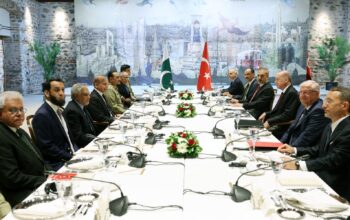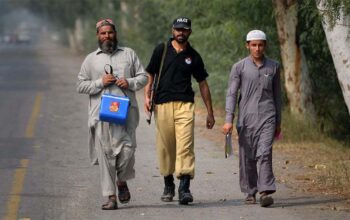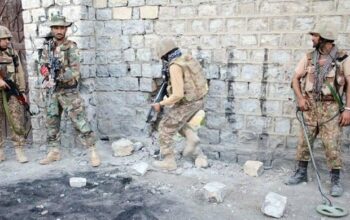By Staff Reporter
ISLAMABAD: Authorities in three of Pakistan’s four provinces have imposed an emergency order banning all gatherings after supporters of former Prime Minister Imran Khan clashed with police, blocked major roads in a string of cities, and stormed military buildings in Lahore, Peshawar, and Rawalpindi.
Violence broke out after Khan was detained in the capital Islamabad by paramilitary troops over graft allegations involving a plot of land.
A video shared by Khan’s Pakistan Taheerk-e-Insaf party showed dozens of paramilitary troops from the Pakistan Rangers escorting Khan into a black SUV, while others beat back some of his supporters in a court complex.
At least one PTI supporter was killed, and six others were injured in a firing incident at a protest rally in Quetta. Khan’s party claimed at least four people were killed and 20 injured in separate clashes.
A spokesman for the Civil Hospital in Quetta confirmed they had received the body of a man with gunshot wounds. “The dead body was brought from the airport road where protests have been taking place since afternoon,” he said, adding that several protesters and policemen with injuries were also brought to the hospital.
Protesters at several places turned violent.
Protesters entered compounds of army commanders in Lahore and Rawalpindi, according to multiple Pakistan media reports after Khan’s arrest. They pelted stones at police vehicles, ablazed public and private vehicles, and tore down street lights and neon signs.
For the first time, Khan’s supporters smashed the main gate of the army’s sprawling headquarters in Rawalpindi, where troops exercised restraint. The protesters chanted slogans against the establishment.
In Lahore, a large number of PTI workers stormed into the Corps Commander Lahore residence and smashed the gate and window-panes. The army personnel present on duty there did not try to stop the enraged protesters who surrounded them and chanted slogans against the ‘handlers’ of the PML-N led government in the military establishment. The protesters held a demonstration in the Cantonment area.
Military sites were later cleared.
Lahore was virtually cut off from the rest of the province because of the protests on main roads, including the entry and exit points.
The caretaker Punjab government called the Rangers to control the law-and-order situation in the most populous province and imposed section 144, under which not more than five people can gather at one point.
In Peshawar, Khan’s supporters set a monument of the Chaghi Mountain inside the premises of the Peshawar Radio Station on fire. The Chaghi mountain model was set up in commemoration of Pakistan becoming a nuclear power in 1998.
Violent protests also spread to Karachi and Hyderabad in Sindh province.
In Karachi, protesters blocked both sides of the main Shahrah-e-Faisal road, which remained closed to traffic as police resorted to heavy tear gas shelling and baton charge in which people from both sides were injured.
Protesters set fire to at least three buildings across the country, while police said dozens of supporters have been arrested.
Michael Kugelman, director of the South Asia Institute at the Washington-based Wilson Center, said the arrest marks a major escalation in a long-running confrontation between Imran Khan and the civilian and military leadership.
The arrest followed soon after Khan repeated earlier allegations that a senior military officer was behind his assassination attempt last year and “given that Khan was detained by paramilitary forces, this was likely the military acting directly. But if so, the civilian leadership, given their long and ugly vendetta with Khan, surely backed the move,” Kugelman added.
Kugelman said the arrest could backfire on the Prime Minister Shehbaz Sharif’s government.
“It could stoke unrest, intensify public fury against the government, anger key Pakistani partners like China that have called for reduced tensions, and raise serious concerns among bilateral donors and the IMF.”
The Pakistan Telecommunication Authority suspended mobile broadband services nationwide after videos of violent protests were shared widely on social media platforms following the arrest of the former premier.
Human rights group Amnesty International has called on the Pakistan Telecommunication Authority to restore internet services in the country and access to Twitter, Facebook, and YouTube.
Meanwhile, the PTI has instructed its leaders, workers, and supporters to gather at the Islamabad Judicial Complex early on Wednesday to continue their sit-ins and protests until the release of Imran Khan.
Taking to its official Twitter handle, Khan’s party stated, “Important instructions from the party leadership: Senior leadership of Tehreek-e-Insaf and workers and supporters of Islamabad will arrive at Judicial Complex Islamabad at 8 am. The ongoing sit-ins and protests across the country will continue in their respective locations until the release of Imran Khan.”
The Islamabad High Court declared Khan’s arrest “legal,” but PTI Senior Vice President Fawad Chaudhry called the decision “surprising” and said it would be challenged in the Supreme Court.
Copyright © 2021 Independent Pakistan | All rights reserved




